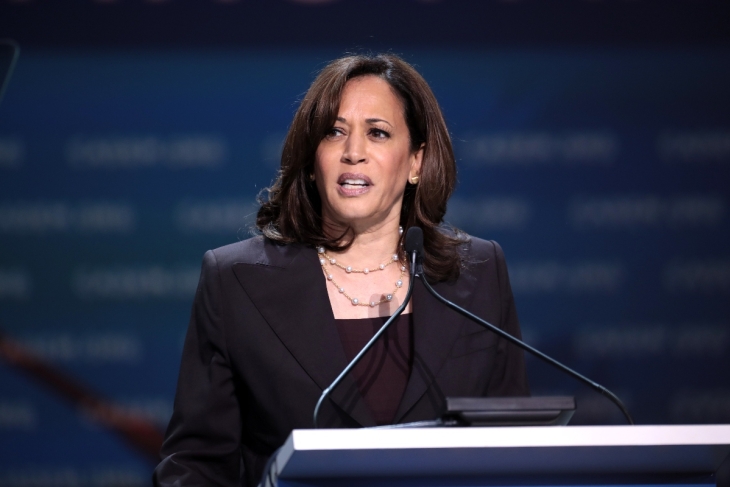Watching the debate last night, all I could think about was my time spent on the playground with my toddler. Her wobbly legs ever close to tumbling down the ladder and causing me constant low-grade anxiety. I felt the same watching Biden fumble through answers, stare into space, and exhibit all the hallmarks of an aging man in cognitive decline. Then, by the end, anxiety had morphed to pity.
I wasn’t alone in my discomfort. The top nine articles on RealClearPolitics this morning—from The Atlantic to the New York Times—all ask versions of the same two basic questions: Can Democrats replace Biden? And who will it be?
No political pundit or party operative myself, I can’t venture a guess or offer any recommendations, but I can inform the public on where potential replacements stand on education policy.
Kamala Harris
As vice president, Kamala Harris is an obvious possibility, and with her position, has perhaps the most education policy to her record. During the pandemic, she spoke to the California Federation of Teachers about the need to inject more money into the system and support SEL initiatives. In addition, while running for president, she promised a $13,500 pay raise to teachers across the country. Standard bland promises given to court the favor of teachers unions.
More interestingly, while California’s attorney general, she implemented a school truancy plan that empowered district attorneys to charge parents with a misdemeanor if children missed 10 percent of school days. While the education reform movement debates and argues about various support plans and incentives to address the nation’s chronic absenteeism, parental accountability and consequences for truancy remain the two elephants in the room. We’ve tried all the carrots. Kamala Harris used the stick.
There’s also her unprompted reference to busing while debating Joe Biden during their campaigns for presidency, likely not a serious proposition, but rather a chance to dunk on a political rival. And finally, she would likely continue the Biden Administration’s efforts for student debt “relief.” (It’s really a glorified “transfer” of wealth from the middle to upper class, but I’ll end my editorializing there.)
Gavin Newsom
California Governor Gavin Newsom is another likely option, and he certainly seems to think that he’s the best choice. But on education, he’s the worst. As I wrote in last weekend’s Wall Street Journal: “Any aspiring policymaker looking for guidance on sensible education reform should take a glance at Sacramento over the past half-decade and do exactly the opposite.”
While governor, the legislators of Sacramento in his party struck down a phonics bill; implemented a math framework that will repeat all the mistakes our nation made over phonics; required an ethnic studies course, which covers every fringe progressive theory ranging from post-colonialism to the decodification of systems of oppression; and prohibited schools from suspending students for willful defiance. Speaking nationally, conservative complaints about “woke” schools are likely overwrought—I’m guilty of this myself—but in California, such accusations ring true: blatant political indoctrination and behavioral chaos.
Gretchen Whitmer
Gretchen Whitmer has a shorter record to her name. Most prominently, as the Governor of Michigan, she presided over a state budget passed this month that offers free pre-K to lower-income families and funds free community college for all. Regarding preschooling, there’s mounting evidence that Head Start and other programs that provide free or reduced-price preschool have, at best, neutral impacts. And recent studies in Boston, Tennessee, Georgia, and North Caroline have found that these initiatives may negatively affect behaviors and academics.
Notably, she also ended Michigan’s short-lived third grade retention law, a policy that, however difficult to enforce, really does benefit students in the long run. And throughout the pandemic she happily acquiesced to union demands—vetoing bills for education savings accounts, reading scholarships, and unmasking children.
The field
As for other options: Governor of Kentucky Andy Beshear blocked charter school and school choice legislation, promised a pay raise, and pushed for universal preschooling. While running for president, Secretary of Transportation Pete Buttigieg said he would raise pay for teachers in Title I schools and that charter schools “have a place.” J.B. Pritzker, governor of Illinois, promises more money and let his state’s school choice program slowly die.
—
Of course, most of these policies were proposed or passed at the state-level, where legislators and governors have real power and authority to govern public schools. The federal government has less authority over education, so few of these laws and initiatives could easily translate to presidential policy.
But there’s one simple theme across these records: no real changes to the system, just more of it. More money, more years in school, more unions, more, more, more. No accountability, no improved instruction, no modified curriculum or raised standards, and no structural changes to funding streams like school choice or governance structures like charters.
I’d take the bland, uninspired promises of Whitmer over the kombucha-fueled progressivism of Newsom, but that’s hardly an inspiring endorsement. A malaise has fallen over Democratic policymaking when it comes to education, and they’d be wise to correct it. Otherwise, they’ll continue to concede this issue to their competitors.




